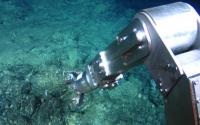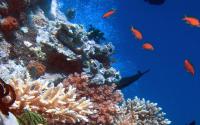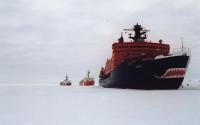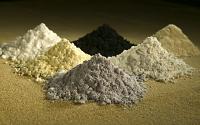Recent News

The world’s oceans are poised for a seabed mining frenzy amid a “marine industrial revolution” that threatens to destroy habitats and wipe out species, an expert has warned.
[ More ]
Legislation to protect ocean areas beyond national borders is moving dangerously slowly, a summit on ocean resources has heard.
[ More ]
The U.S. Coast Guard has determined — through independent analysis — it needs three heavy and three medium icebreakers to cover the U.S. anticipated needs in the Arctic and Antarctic, commandant Adm. Paul Zukunft, told reporters on Tuesday.
[ More ]
The latest setback to seabed mining has alarmed companies in resources extraction. Now they are urging New Zealand government to consider changing law to ensure that it does not block economic development.
[ More ]
The high seas—the vast roiling ocean that reaches beyond a coastal states’ 320-kilometer exclusive economic zone, or EEZ—is Earth’s largest biosphere. It represents about 58 percent of our planet’s oceans and is mostly unexplored, exhaustively exploited and in rapid decline. That’s why there was cause for celebration a few weeks ago when, after a decade of hair-pulling discussions, national representatives at the United Nations finally agreed that the high seas need protection.
[ More ]
While deep sea mining is yet to commence in the region, Pacific Island countries are proactively developing legal instruments to ensure appropriate management of their deep sea mineral resources, with particular attention to the protection of the marine environment.
[ More ]
Scientists looking for deep sea organisms on a research cruise last month got a surprise when, instead of deep sea life, they pulled up metal balls the size of softballs. The German researchers stumbled inadvertently onto the discovery of the largest deposit of manganese nodules known to exist in the Atlantic ocean.
[ More ]
Newly analyzed satellite imagery shows the speed at which China is creating a land mass that could support a military force in a hotly dispute part of the South China Sea that is also claimed by other Asian nations.
[ More ]
The Arctic could become a site of future turmoil, and not just because of the emerging geopolitical tensions and militarization in the region. Beyond concerns of a frozen conflict in the icy north, there is the additional fear that the Barents and Kara Seas could become the location of a slow-motion nuclear disaster. Until 1991 the Soviet Union used the seas as a junkyard where it would dispose of its nuclear waste and several of its scuttled nuclear submarines could create Chernobyl-like environmental catastrophes.
[ More ]
Singaporeans and companies based here will have to obtain a licence before mining for minerals in the open sea as the Deep Seabed Mining Bill was passed in Parliament today (12 Feb).
[ More ]